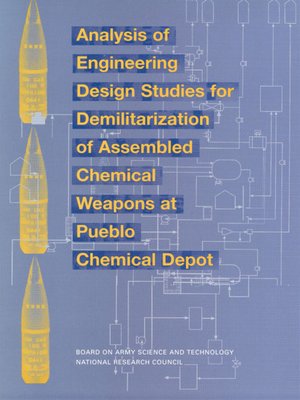Analysis of Engineering Design Studies for Demilitarization of Assembled Chemical Weapons at Pueblo Chemical Depot
ebook
By National Research Council

Sign up to save your library
With an OverDrive account, you can save your favorite libraries for at-a-glance information about availability. Find out more about OverDrive accounts.
Find this title in Libby, the library reading app by OverDrive.



Search for a digital library with this title
Title found at these libraries:
| Loading... |
<p>The Program Manager for Assembled Chemical Weapons Assessment (PMACWA) of the Department of Defense (DOD) requested the National Research Council (NRC) to assess the engineering design studies (EDSs) developed by Parsons/Honeywell and General Atomics for a chemical demilitarization facility to completely dispose of the assembled chemical weapons at the Pueblo Chemical Depot in Pueblo, Colorado. To accomplish the task, the NRC formed the Committee on Review and Evaluation of Alternative Technologies for Demilitarization of Assembled Chemical Weapons: Phase II (ACW II Committee). This report presents the results of the committee's scientific and technical assessment, which will assist the Office of the Secretary of Defense in selecting the technology package for destroying the chemical munitions at Pueblo.</p>
<p>The committee evaluated the engineering design packages proposed by the technology providers and the associated experimental studies that were performed to validate unproven unit operations. A significant part of the testing program involved expanding the technology base for the hydrolysis of energetic materials associated with assembled weapons. This process was a concern expressed by the Committee on Review and Evaluation of Alternative Technologies for Demilitarization of Assembled Chemical Weapons (ACW I Committee) in its original report in 1999 (NRC, 1999). The present study took place as the experimental studies were in progress. In some cases, tests for some of the supporting unit operations were not completed in time for the committee to incorporate results into its evaluation. In those cases, the committee identified and discussed potential problem areas in these operations. Based on its expertise and its aggressive data-gathering activities, the committee was able to conduct a comprehensive review of the test data that had been completed for the overall system design. This report summarizes the study.</p>






